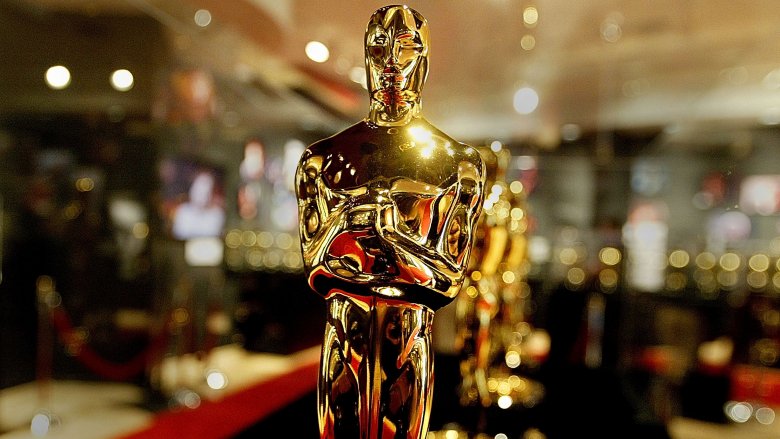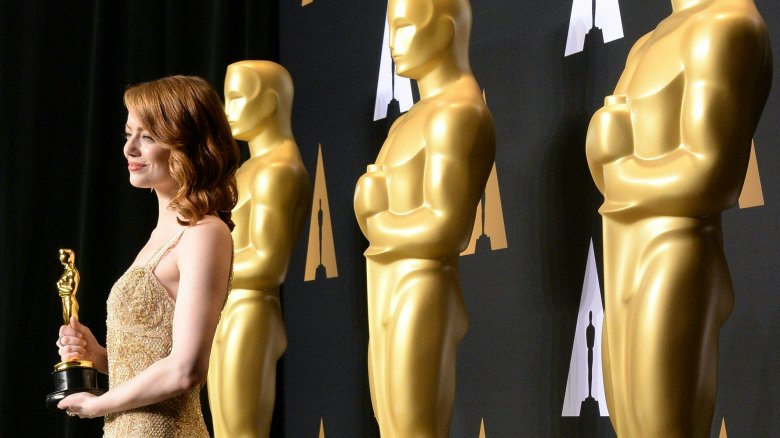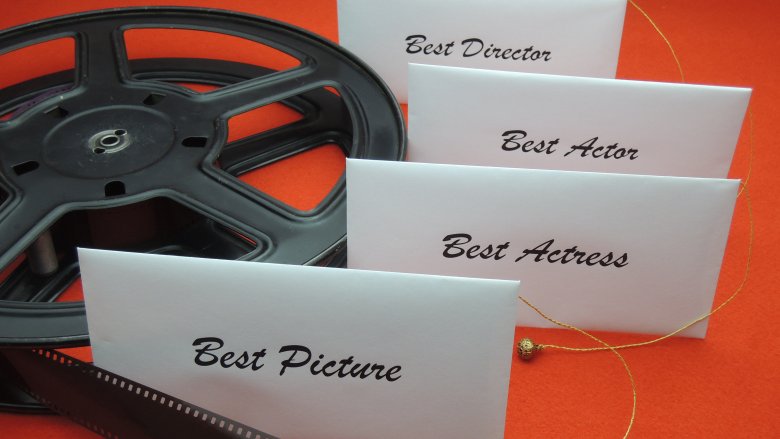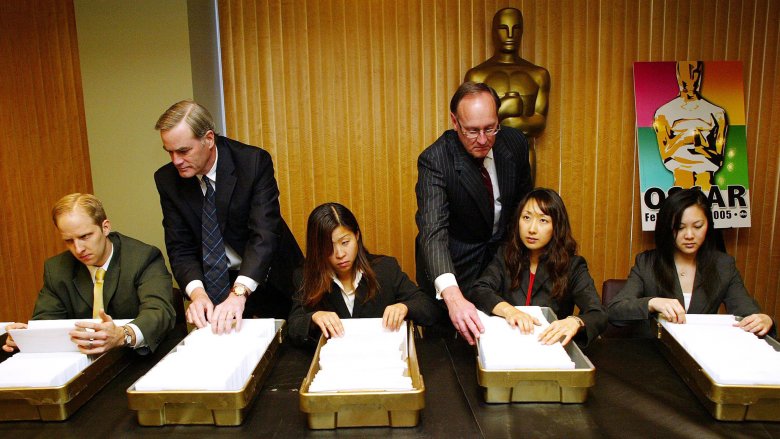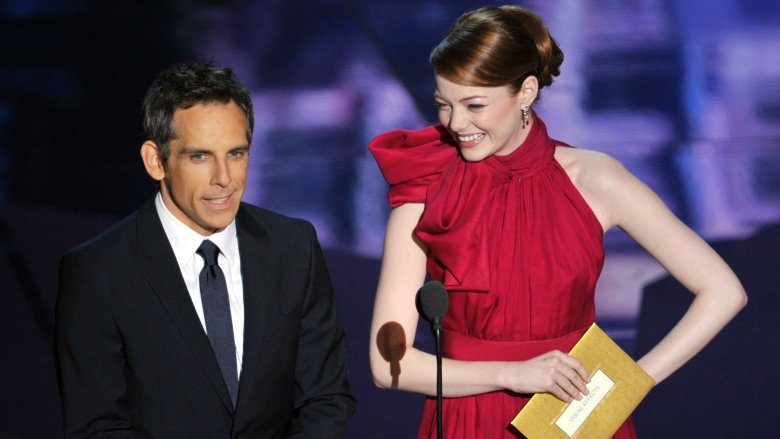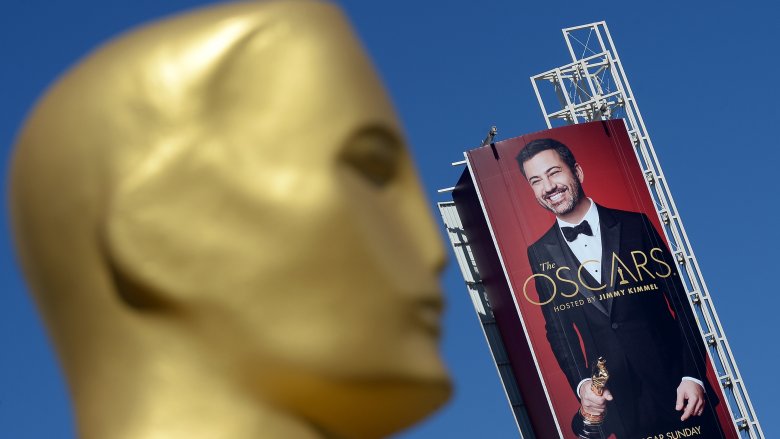False Things You've Always Believed About The Academy Awards
The Academy Awards. For those who love films, or actors, or even just celebrity gossip, Oscar night is like the Christmas of the pop culture calendar. Is there anything more fun than watching beautiful people dressed up in outfits that cost more than your car, watching the joy on the winners' faces and the fake passiveness on the losers' faces? And these days no Academy Awards viewing would be complete without hopping on Twitter and arguing with strangers about who was egregiously snubbed.
But no matter how much you love them, what you think you know about the Oscars might be wrong. Over the years plenty of myths have arisen about the famous awards, and now it is time to right those wrongs.
The Oscar Curse: Your career goes downhill once you win
There is a famous Oscar Curse that says that anyone who wins an Academy Award will soon see their career in tatters. This urban legend dates back all the way to the 1930s, when one actress did see her career take a nosedive after winning two years in a row. Luise Rainer won best actress awards in 1937 and 1938 for The Great Ziegfeld and The Good Earth. But you probably haven't ever heard her name because she didn't do much after that. She blamed her Oscar wins for her plight, and the idea of the curse was born.
In more recent times there have been a few examples that people hold up as evidence of the curse. Cuba Gooding Jr. won best supporting actor in 1997 for Jerry Maguire, Halle Berry won in 2002 for Monster's Ball, Adrien Brody won best actor in 2003 for The Pianist, and Mo'Nique won in 2010 for her performance in Precious. None of them have done much work since their wins.
But according to Cinema Blend, math tells us they are outliers and most winners see their careers soar after getting an Oscar. A professor published his findings in the journal Organization Science after looking at the careers of 1,023 actors and actresses. Both nominees and winners see their careers improve after a gong, with most starring in more films in the next five years than other actors who don't get recognized for their work. Take that, curse!
The Oscar Love Curse: Women who win get divorced
Something as big as the Academy Awards has room for more than one curse to be attached to it. Not content with supposedly ruining actors' careers, winning an Oscar is also supposed to wreak havoc with the best actress winners' relationships. The curse says when they go home with the statue, Oscar will be the only man in their lives soon after because they'll end up divorced.
There have been a few high-profile examples of this curse in recent years. Sadly, Reese Witherspoon, Sandra Bullock, Halle Berry, and Hillary Swank all saw their relationships crumble after they were awarded the top gong. But despite this, research tells us that no happily married actress has to live in fear of reaching the top of her profession and then hitting the bottom of her personal life as a result.
Once again, we can thank that professor who published in Organizational Science for his research (this time covered by New Republic). He looked at 808 "elite" actors. Amazingly, it turned out that women who won were actually 85 percent less likely to get divorced, and even those who were simply nominated were 68 percent less likely to break up.
There was one exception, though. If the woman was part of a couple made up of two actors and she won, she was more likely to get divorced. One possibility is that the man in the couple might find it hard being outshone by his wife when they are in the same profession. That's show biz!
Comedies and comedic performances have no chance
We all know the best way to get recognized for your work in Hollywood is not to go for comedy. The Academy supposedly loves drama and dramatic performances, the more tear-jerking the better. Making them cry with laughter is not the way to go if you want to take home that little man. But while this holds true a lot of the time, the Oscars by no means turn their noses up at funny performances consistently. You can make lighter fare and still get rewarded for it.
While it's rare that a comedy film will win best picture, it has happened. According to AMC's Filmsite, over the years seven out-and-out comedies have won, like 1938's You Can't Take It with You, 1977's Annie Hall, and as recently as 2011, The Artist. Another seven winners were more dramatic but had comedic elements, like 1994's Forrest Gump and 2014's Birdman.
Actors can find themselves nominated for their work in comedies more often than you would think as well. Some notable examples, from ThoughtCo, Woody Allen was nominated for his acting work in Annie Hall as well as best picture, Robin Williams was recognized for his work in Good Morning, Vietnam, and Alan Arkin actually won for his role in Little Miss Sunshine. There have been others as well, and not just in acting categories. Kristen Wiig won best original screenplay for writing the hit Bridesmaids. And honorary and lifetime achievement Oscars have gone to comedians a bunch of times.
Marisa Tomei was only awarded her Oscar by mistake
This is perhaps the most famous rumor ever to come out of an Oscar broadcast. Snopes says in 1993, Marisa Tomei was nominated for best supporting actress for the broad comedy My Cousin Vinny. Just getting nominated was amazing, considering her competition was famous actresses like Joan Plowright and Vanessa Redgrave who had starred in heavy, more traditional movies like Howards End and Enchanted April. But on the night it was Tomei who went home with the gong. So was it all a big mistake?
After she won, the rumors started in earnest. She wasn't the real winner, it was supposed to go to Vanessa Redgrave, but the presenter, Jack Palance had gotten confused or was too drunk or stoned to read the card that was in front of him. So, instead, he read the last name that had been called of the nominees, and the only one that was still on the teleprompter, Tomei's. The Oscars had no choice but to let her keep it to avoid embarrassment.
If you watched the 2017 Academy Awards broadcast, you know that any mistakes are immediately corrected. In that case, the best picture winner was announced as La La Land when it was really supposed to go to Moonlight. Within minutes the error was corrected. The same thing would have happened with Tomei had she not been the actual winner. The accounting firm PriceWaterhouseCoopers has two accountants who know all the winners standing backstage to make sure the right person wins.
Oscars are only worth $1
Let's say you used to be a famous, successful actor or sound editor, or whatever. You won the ultimate accolade and have an Oscar to show for your hard work. But since then you've fallen on hard times and want to sell your award for some spare cash. There's a famous rule that all Oscars must first be offered back to the Academy for the princely sum of $1, and unfortunately, this one is at least partially true. But that doesn't mean Oscars are virtually worthless.
First, there are the statues themselves. According to Vanity Fair, back in 2011 it was estimated that the little guys are worth about $400 in raw materials and labor. (While that is real gold, it's just plated. The rest of it is mostly tin.) But what makes an Oscar special is who gets it and why. This can inflate their value hugely.
The $1 return rule does exist, but it's only enforced for Academy Awards that came after 1950. And there's a big market for the ones that came before then. The highest price ever paid for one of them was a whopping $1,542,500 for the Gone with the Wind best picture Oscar in 1999, to Michael Jackson. Vivien Leigh's best actress award for the same film went for more than $500,000. Oscars also get stolen from time to time because thieves know they'll be worth a lot of money. They're also just a nice conversation piece for the living room.
There can only be one winner
After the Moonlight/La La Land best picture debacle at the 2017 ceremony, maybe nothing that happens when they open the envelope will ever surprise you again. But amazingly, weirder stuff can happen. Like, for example, when they call out the winner, they won't necessarily just be saying one name. There have been five ties in the history of the Academy Awards. You wouldn't think it would happen with thousands of people voting, but it sure has.
To be fair, one of the times it wasn't really a tie. Slate says in 1932, when the awards were just a baby finding its legs, one of the best actor nominees beat another contender by one vote. That would be cool in and of itself, but for some reason the Academy decided this was close enough to be a tie and gave them both the award. These days they have changed the rules and only real ties get counted as ties because ... well, they are. Makes sense.
In 1949 there was the first actual tie for best documentary short. In 1986 there was a tie for best documentary. Then in 1995 it was live action short that saw two winners. The most recent tie was in 2013, when best sound editing was called for both Zero Dark Thirty and Skyfall. But the most famous and most interesting tie must be the 1969 one for best actress when both Barbra Streisand and Katharine Hepburn received 3,030 votes each.
The voters are an even makeup of Hollywood
Getting invited to join the Academy is a great honor for anyone working in the movie biz. You'd think the voting members would be a diverse group of people reflecting what's going on in movies today. But you'd actually be hard-pressed to find a place less diverse than the Academy, and it's reflected in who gets nominated for awards.
A 2013 LA Times report found the makeup of the Academy was a shocking 93 percent white and 76 percent male. The average voter age was 63. That's ... not really what Hollywood looks like these days. This mismatch finally led to controversy in 2016. According to USA Today, for the second year in a row, all of the 20 actors and actresses nominated for awards were white. Before 2015 this hadn't been the case since 1998. Soon #OscarsSoWhite was taking over Twitter. People demanded that something be done to make nominees consistently more diverse.
The Academy heard their cries and decided to do something about it. Now you must have been active in films in the last 10 years or you lose your voting rights. They're hoping to get rid of the stodgy, maybe a little bit racist old guys who haven't worked in ages but still have a huge say over who gets recognized for their work.
Certain types of roles are more likely to win
There are some types of acting roles that are immediately obvious as "Oscar-bait." Supposedly there are certain roles you can play that will always get more recognition when it comes time to hand out nominations and awards. But this doesn't always hold up under scrutiny.
Entertainment Weekly did some fabulous myth-busting when it comes to who wins for what. The first myth they addressed is that one of the best things a straight man or woman can do for their career is play an LGBTQ character. The first actor ever to be nominated for "playing gay" was Peter Finch in 1971. Then in 1986, William Hurt won for playing a gay man in Kiss of the Spider Woman. The myth really took hold in 1998 when Greg Kinnear won for As Good as It Gets. Since then, while a large number of actors have been nominated for playing LGBTQ characters, this hasn't actually translated into a large number of wins.
EW also looked at actresses who make the decision to bare all on screen. If a woman lets it all hang out, is she more likely to win? They found out she was not. The first time a woman won after showing off her assets was in 1965. But of the 25 nude performances they looked at, less than half of them took home the statue. This doesn't even count the many in-the-buff performances that didn't even get a nomination.
The presenter often has a link to the winner
Some people think you can tell who will win a certain award by who's selected to present it to them. And over the years there have been some odd coincidences in Oscar handoffs.
A few times it's been just plain awkward, like when William Hurt had to present an award to Marlee Matlin when they had just broken up a few months before. Or the time Harrison Ford was selected to give out the best picture Oscar, when everyone thought Saving Private Ryan and his old friend and director Steven Spielberg would take home the gong, and he ended up having to give it to Shakespeare in Love.
The truth is that Hollywood's a small town, and everyone seems to have a connection to someone. Out of the 25 years Entertainment Weekly looked at, presenters only had even a tenuous connection to the winner 18 times out of a possible 151. It might be the case that when the bookers have a good idea who might win something they try to get someone with a connection, but they won't always be right. Only two accountants know the actual winners until they're announced on stage, so there's no way to be sure that any connection will pan out. And for some categories, like best actor and best actress, the presenters are the last year's winner from the other category, so any connection there is purely accidental.
It's always been called the Oscars
Officially, the statue they give out on the big night is called the Academy Award of Merit, but you've probably never heard that because absolutely everyone calls them the Oscars. But this wasn't always the case.
According to the Academy's own website, the popular story is that the statue got its nickname by accident. The Academy of Motion Picture Arts and Sciences formed in 1927 and threw its first big party to tell everyone how awesome it was two years later. They designed their award to look like a knight holding a sword, standing on a reel of film with five spokes to represent the academy's five branches (actors, directors, etc.). The little guy was only 13.5 inches high but weighed in at a surprisingly hefty 8.5 pounds.
The story goes that when the Academy's librarian Margaret Herrick saw the finished product, she remarked that it looked like her uncle Oscar. (Uncle Oscar must have had dead unseeing eyes and fabulous cheekbones.) For some reason, her comment seems to have made a big impression and the nickname stuck. It took until 1939 for the Academy to fully embrace the nickname, but it was well-known enough by 1934 to be used in a newspaper column on the awards. And these days it's almost the official name for the whole awards show.
